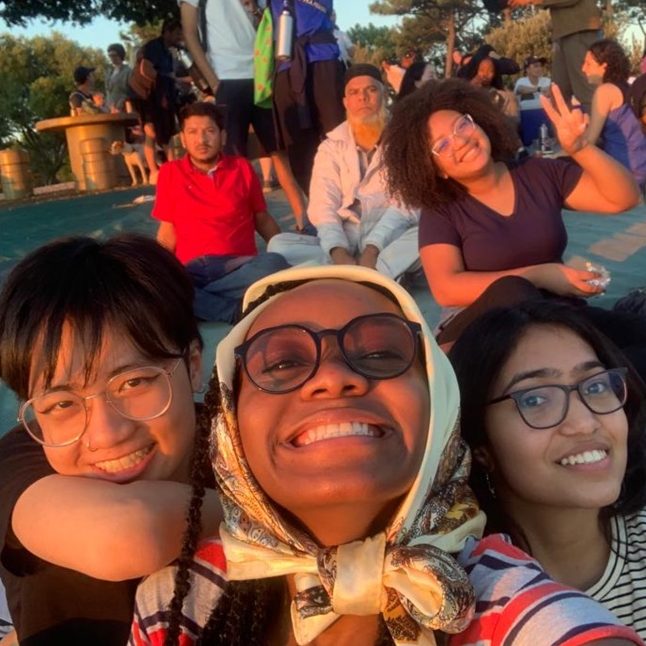RESOURCES
2025-05-07
Preparing for Future Employment: Mastering Soft Skills and Lifelong Learning
Discover how to prepare for future employment by developing essential soft skills and engaging in transformative experiences like those offered by Tilting Futures.
Published by Tilting Futures

The job market is evolving at an unprecedented pace. Rapid technological advancements, globalization, and shifting workforce demands are reshaping how industries function. Automation, artificial intelligence, and digital transformation are disrupting traditional career paths, creating new opportunities but also presenting new challenges for job seekers.
To stay competitive, individuals must proactively prepare for future employment by developing essential skills, embracing lifelong learning, and gaining real-world experience. The workforce of the future will demand adaptability, problem-solving abilities, and strong interpersonal skills in addition to technical expertise. By focusing on these areas, job seekers can position themselves as valuable assets in an increasingly dynamic job market.
Understanding the Future of Work
Technological Advancements and Automation
Impact on Job Roles
Automation and artificial intelligence (AI) are transforming industries across the globe. While some traditional roles are becoming obsolete due to machine learning and robotic process automation, new job opportunities are emerging. Industries such as healthcare, cybersecurity, and renewable energy are experiencing growth, requiring a workforce that can navigate technological advancements. As AI continues to integrate into workplaces, jobs that involve creative problem-solving, emotional intelligence, and critical thinking will become more valuable. Employees must develop the ability to work alongside technology rather than compete with it.
Emergence of New Job Categories
Future Roles
As technology and society evolve, new job categories are emerging. Fields such as data science, digital marketing, renewable energy, and AI ethics are experiencing rapid expansion. Jobs related to sustainability, cybersecurity, and space exploration are also on the rise. Individuals who anticipate these trends and develop relevant skills will have a competitive edge in the job market. Success in these emerging roles requires a combination of technical expertise and soft skills. Employers seek individuals who can think critically, collaborate effectively, and communicate complex ideas clearly. Those who invest in developing both their hard and soft skills will be well-positioned for the careers of the future.
The Role of Soft Skills in Career Advancement
Definition and Importance of Soft Skills
Interpersonal Skills
While technical skills are necessary, soft skills are equally—if not more—important in today’s workforce. Effective communication, teamwork, and empathy help employees collaborate and build meaningful professional relationships. Life skills such as emotional intelligence, leadership, and active listening enable individuals to work effectively in diverse environments. Adaptability is essential in a fast-changing world. Employees must navigate new challenges, technological disruptions, and shifting business landscapes with confidence. Strong problem-solving skills allow individuals to analyze situations, develop solutions, and make informed decisions—a critical asset for any employer.
Soft Skills vs. Technical Skills
Complementary Nature
Soft skills and technical skills are not mutually exclusive; rather, they complement each other. A software developer, for example, must not only have coding expertise but also be able to collaborate with teams, communicate technical concepts, and think creatively. Those who can balance both technical proficiency and interpersonal skills will thrive in their careers. More than ever, employers value soft skills alongside technical expertise. Companies seek employees who can adapt to change, communicate effectively, and contribute to a positive work culture. A strong foundation in soft skills enhances career prospects and increases the likelihood of professional growth.
Lifelong Learning and Continuous Skill Development
Embracing Lifelong Learning
In today’s rapidly changing job market, the concept of lifelong learning has become increasingly crucial. Gone are the days when formal education alone was sufficient for career success. With technological advancements and shifting industry standards, individuals must continue learning throughout their careers to remain competitive. Embracing lifelong learning means more than just staying up to date with new tools or techniques; it involves cultivating a mindset that sees learning as an ongoing journey. Whether it’s through formal educational opportunities, self-driven exploration, or informal learning through peers and colleagues, the ability to adapt and grow in your professional life is a key factor in long-term success.
Continuous Education
To stay competitive and marketable, professionals must commit to continuous education. The job market demands that individuals be adaptable and knowledgeable about the latest advancements in their fields. This requires consistent updating of skills and knowledge, which can be achieved through a combination of formal education, online courses, and industry-specific training. Continuous education ensures that employees are not left behind as new technologies emerge, and it provides a significant advantage when seeking promotions or new job opportunities. Furthermore, in many industries, regular skill enhancement is not only beneficial but necessary for maintaining job relevance.
Micro-Learning Opportunities
Short, focused learning sessions—such as webinars, podcasts, and skill-based workshops—offer efficient ways to acquire new skills in a time-effective manner. Micro-learning allows individuals to gain practical knowledge in smaller, more digestible chunks, making it easier to stay relevant in an ever-evolving job market. With the rise of online learning platforms, these opportunities are more accessible than ever, providing professionals with an array of learning materials that can fit seamlessly into their daily routines. This approach is perfect for those looking to build new skills without dedicating extensive amounts of time to a formal course. These bite-sized learning sessions allow individuals to remain agile, adapting quickly to the changes in their industries.
Leveraging Online Resources
E-Learning Platforms
Online platforms like Coursera, Udemy, and LinkedIn Learning have transformed how professionals access education. These e-learning platforms offer a vast range of courses in a variety of disciplines, from technology and business to arts and humanities. By taking advantage of these flexible learning opportunities, individuals can gain certifications or deepen their expertise in a specific field without disrupting their careers. E-learning is particularly useful for those who require the flexibility to learn at their own pace while balancing their professional or personal commitments. The availability of these resources has made learning more accessible and democratized, empowering individuals to pursue career development on their own terms.
Webinars and Workshops
Attending webinars, networking events, and hands-on workshops provides professionals with invaluable exposure to industry experts and emerging trends. These platforms offer opportunities for both technical learning and the development of interpersonal skills. Whether through gaining insights into cutting-edge developments or learning practical strategies for career growth, professionals can use these experiences to stay ahead of the curve. Webinars and workshops also serve as powerful networking tools, allowing participants to forge connections that could lead to job opportunities or collaborations. Investing time in these resources enhances not only technical knowledge but also soft skills that are essential for career progression in today’s interconnected world.

Considering a semester abroad?
See how Take Action Lab could align with your goals.
Gaining Practical Experience through Gap Year Programs and Apprenticeships
Benefits of Experiential Learning
Real-World Application
The gap between academic learning and real-world professional experience can be difficult to bridge. To address this gap, many individuals turn to experiential learning opportunities such as gap year programs and apprenticeships. These hands-on experiences provide students and young professionals with direct exposure to real-world challenges, allowing them to apply theoretical knowledge to practical situations. This type of learning helps individuals build confidence, enhance their problem-solving skills, and develop a deeper understanding of their chosen fields. Experiential learning is particularly valuable for those looking to make a smooth transition from the classroom to the workplace, equipping them with the practical tools they need to succeed.
Skill Enhancement
Experiential learning also promotes the development of both technical and soft skills. Immersive learning experiences, whether through internships, apprenticeships, or service-learning projects, allow individuals to acquire and refine skills in real-world settings. These opportunities provide more than just knowledge—they offer the chance to cultivate critical thinking, teamwork, leadership, and communication skills. By learning in a professional environment, participants gain a deeper understanding of industry-specific practices, all while building their professional networks. These experiences foster a sense of responsibility and self-confidence that can be crucial for future job success.
Tilting Futures’ Approach
Program Overview
Tilting Futures offers some of the best gap year programs that prepare students for future employment by providing them with immersive, hands-on experiences. These programs equip individuals with vital leadership, communication, and adaptability skills, making them more competitive in the workforce. By participating in Tilting Futures’ gap year programs, students not only gain professional experience but also engage in activities that promote personal growth, cultural awareness, and global citizenship. These well-structured programs ensure that participants develop the skills necessary to thrive in a globalized world, with opportunities to learn from diverse perspectives and cultures.
Cultural Immersion and Global Impact
One of the standout features of Tilting Futures’ programs is the emphasis on cultural immersion. By stepping into different communities and engaging with new cultures, students gain a broader perspective of the world, develop critical problem-solving abilities, and learn how to work effectively with people from multiple backgrounds. Exposure to different cultural contexts fosters adaptability—an essential skill in today’s interconnected world. The experience not only enriches students’ personal lives but also helps them become more compassionate, open-minded, and globally aware citizens, ready to make an impact wherever they go.
Building a Resilient and Adaptable Mindset
Embracing Change
Growth Mindset
Adopting a growth mindset is essential for personal and professional development. Individuals with a growth mindset view challenges as opportunities to learn and grow, rather than obstacles to avoid. Embracing change and challenges as part of the learning process encourages continuous improvement. This mindset shift can significantly enhance an individual’s resilience in the face of setbacks and help them maintain a positive outlook when navigating difficult situations. The ability to adapt and grow, rather than remain fixed in one’s approach, is a key trait that helps people succeed in today’s ever-changing work environment.
Flexibility
Flexibility is another crucial component of a resilient and adaptable mindset. In an increasingly dynamic job market, being open to new ideas, learning new skills, and adjusting to shifting circumstances is vital. Flexibility enables individuals to respond effectively to unforeseen challenges, making them more prepared for unexpected changes in their professional paths. By embracing new opportunities and staying agile, individuals position themselves for long-term career success, regardless of the unpredictable nature of the job market.
Networking and Mentorship
Professional Connections
Building a strong professional network is essential for career growth and development. A well-established network provides individuals with access to job opportunities, industry insights, and collaborations that can propel their careers forward. Engaging with mentors, industry professionals, and peers can open doors to new career paths and personal development opportunities. The relationships formed through networking also provide ongoing support and guidance, allowing individuals to navigate their professional journeys with confidence and informed decision-making.
Seeking Guidance
Mentorship plays a pivotal role in shaping an individual’s career trajectory. By seeking guidance from experienced professionals, individuals gain insights into industry trends, effective strategies for career growth, and valuable feedback on their strengths and weaknesses. Mentorship helps mentees build confidence, set clear career goals, and refine their skills to succeed in their chosen fields. It offers a safe space to discuss challenges, celebrate successes, and explore new opportunities for personal and professional growth.
Prepare for Future Employment with Tilting Futures
Preparing for future employment requires a proactive approach that combines technical expertise, soft skills, lifelong learning, and hands-on experience. As industries evolve, individuals must embrace adaptability, invest in continuous education, and seek opportunities for real-world learning.
Tilting Futures offers transformative programs that equip young professionals with the skills and experience necessary to succeed in a rapidly changing job market. By participating in immersive learning experiences, individuals gain the confidence and adaptability needed to thrive in the careers of tomorrow.
Take the next step in preparing for future employment. Apply today and unlock your potential with Tilting Futures’ career-focused programs.


